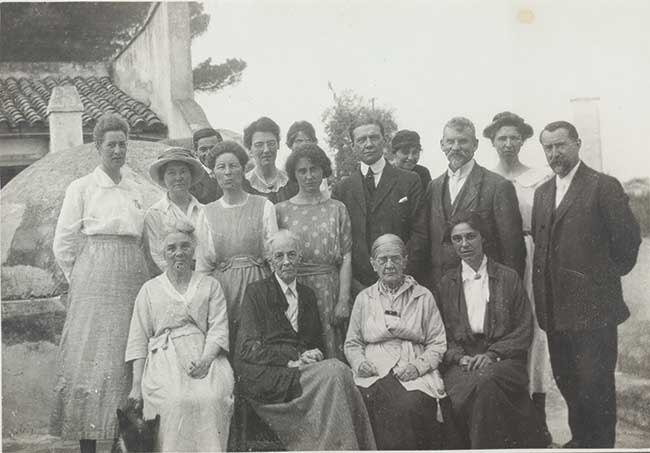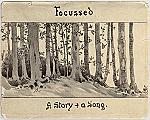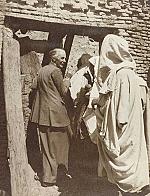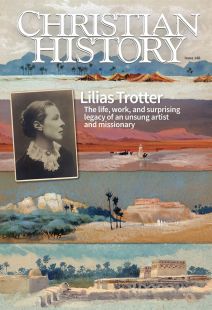Artists, angels, apostles, and the abode of peace

[Photograph of Lilias Trotter and Samuel Zwemer with Algiers Mission Band—Used by permission of Lilias Trotter Legacy and Arab World Ministries of Pioneers. Trotter is front row, second from left and Zwemer second row, third from right.]
John Ruskin (1819–1900)
Born in London as an only child, John Ruskin was doted on by both parents. From his father, a wine merchant, Ruskin developed a love for Romanticism, especially the works of Sir Walter Scott (1771–1832). With his mother, a devout Christian, Ruskin read the Bible, cover to cover, and together they memorized large swaths of the text.
In addition to receiving a thorough secular and religious education, Ruskin traveled throughout Europe with his family. During these long adventures, Ruskin began his astute observations of nature and his surroundings—recording poetry, drawings, maps, and reflections in his notebooks.
In 1836 Ruskin enrolled at Christ Church, Oxford. Although he was ill much of his time there, the highlight of his Oxford experience occurred when he won the esteemed Newdigate Prize for poetry in 1839. By 1843 Ruskin embarked on the first volume of Modern Painters, a work that would eventually become five volumes over 17 years. The volume’s initial purpose was a defense of the artist J. M. W. Turner. Ruskin became known as an art critic who imbued his work with Romantic sensibilities, and he continued traveling Europe while also writing, teaching, and lecturing in England and Scotland. In 1871 he founded the Ruskin School of Drawing and Fine Art at Oxford, which still exists.
In 1876 Lilias Trotter and her mother stayed at the same Venetian hotel as Ruskin. There Trotter’s mother asked Ruskin about Lilias’s artistic skills, which Ruskin praised (see pp. 6–10). Eventually Ruskin told Trotter she had limitless artistic potential if she stuck with her craft. After much prayer, however, Trotter came to a different conclusion: “I see clear as daylight now, I cannot give myself to painting in the way [Ruskin] means and continue to ‘seek first the Kingdom of God and His Righteousness.’”
Ruskin died at age 80 in his English Lake District home in 1900, a giant in the world of art, architecture, literature, theory, and criticism. He and Trotter maintained a lifelong correspondence and friendship.
Hannah Whitall Smith (1832–1911)
Born in Philadelphia, Hannah Whitall was raised in a devout Quaker family. In 1851 she married another prominent Quaker, Robert Pearsall Smith. By 1865 they had relocated to New Jersey and experienced faith formation through the Wesleyan Holiness movement, with an emphasis on sanctification by faith and personal salvation. Robert and Hannah both began preaching and contributing to Robert’s magazine, Christian’s Pathway to Power.
Between 1873 and 1875, Robert took part in Holiness revivals in England, where Hannah joined him as speaker. She was known as the “angel of the churches” for her ability to speak beautifully about sanctification and salvation in Christ. She relates in her spiritual autobiography the moment she truly understood sin:
In every human face I saw, there seemed to be unveiled before me the story of the misery and anguish caused by the entrance of sin into the world. I knew that God must see this with far clearer eyes than mine, and therefore I felt sure that the sufferings of this sight to Him must be infinitely beyond what it was to me, almost unbearable as that seemed.
In her twenties Trotter began attending Higher Life Movement talks; while listening to Hannah’s speeches, Trotter gained a clear sense of intimacy with God and how it leads to a desire to serve others.
The Smiths’ time in England was cut short in 1875 when Robert was entangled in an adulterous scandal; they retreated stateside. Back in the United States, Hannah began to write, including the instant classic The Christian’s Secret of a Happy Life (1875): “Today it is your happy privilege to prove, as never before, your loyal confidence in the Lord by starting out with Him on a life and walk of faith, lived moment by moment in absolute and childlike trust in Him.”
Hannah also helped found the Woman’s Christian Temperance Union and advocated for women to attend universities. Because their daughter Mary wed an English lawyer, the Smiths eventually returned to England, where Hannah died in 1911. The Smiths’ daughter Alys (1867–1951) became a charity organizer and the first wife of famous philosopher Bertrand Russell (1872–1970), and their son, Logan (1865–1946), became a famous writer and critic.
Dwight L. Moody (1837–1899)
One of the best-known evangelists of the nineteenth century, Dwight L. Moody was born into a large family in Massachusetts. When Moody was a child, his father died, and he was sent off to work for his room and board. By age 17 he moved to Boston to work under his uncle in the shoe trade. His uncle insisted he go to his Congregational church. There Moody heard the gospel and converted from Unitarianism to evangelicalism. His Sunday school teacher later called Moody the least likely convert and even less likely “to fill any extended sphere of public usefulness.”
Unable to conscientiously enlist in the Civil War, Moody began working with the Young Men’s Christian Association (YMCA), started the nondenominational Moody Church in Lincoln Park in Chicago, and began ministering in the slums of that city with which he would be connected for the rest of his life. In 1870 Moody met the talented hymn writer and singer Ira Sankey (1840–1908). After the two joined forces, his ministry grew exponentially. Together they went on evangelism tours in Great Britain from 1873–1875 and 1881–1884.
When Trotter volunteered to counsel people who had questions after Moody’s revival meetings in England, Moody encouraged Trotter and her fellow counselors with the privilege of helping to win souls for Christ:
You must ply them with the Word of God, and wait patiently until you see that they have grasped the truth, and are resting on Christ, and Christ alone, for salvation. Don’t be in a hurry. Think, oh! Think what it means to win a soul for Christ, and do not grudge time spent on one person.
Moody also held massive revivals—with crowds numbering as many as 20,000 souls—back in the United States. He founded the Moody Bible Institute in Chicago in 1886, and passed away the day after Christmas 1899. He had preached his final sermon the month before.
John Mott (1865–1955)
Born in New York, John Mott grew up in Iowa and graduated from Cornell University in 1888. At first deciding between following his father into the lumber business or becoming a lawyer, Mott changed his mind when he heard English cricketer Kynaston Studd ask during a university speech, “Seekest thou great things for thyself? Seek them not. Seek ye first the Kingdom of God.” (For more about Studd, see issue #132.) Deciding to follow the call of Christ into missions work, after graduation Mott became the national secretary of the Intercollegiate YMCA until 1915.
In addition to holding his position at the YMCA, Mott chaired various foreign missions organizations and went on a two-year tour to activate Christian student groups in India, China, Japan, Korea, Australia, and Europe. He also was a critical member of the planning committee for the famous 1910 Edinburgh World Missionary Conference and presided over most of its sessions.
When World War I erupted, Mott served as general secretary of the National War Work Council and received the Distinguished Service Medal. He maintained many contacts around the world and helped bring relief to prisoners of war. As part of his extensive travels, he and Trotter met; she attended missions conferences he hosted in Constantine and Jerusalem in 1924.
Along with sociologist Emily Greene Balch, Mott was awarded the Nobel Peace Prize in 1946 “for his contribution to the creation of a peace-promoting religious brotherhood across national boundaries.” Two years later, in 1948, he was made lifetime president of the World Council of Churches, which he had been instrumental in forming. John Mott died in Florida at the age of 89.
Eva of Friedenshort (1866–1930)
Eva von Tiele-Winckler was born to a wealthy and well-connected family in Germany in 1866. When she was 17, she had a conversion experience and decided to dedicate her life to Jesus and his people. She had a passion to help the poor in her area, and after begging her father, he allowed her to train as a nurse in Westphalia. Her father also helped finance a house for her near her family’s castle in Miechovitz where she could do her work. She called the house Friedenshort, “abode of peace.”
In 1893 von Tiele-Winckler felt called to create an “evangelical sisterhood,” a group of women who desired to follow God’s call to care for the poor and infirm. These women soon saw a vast need for orphan care, and von Tiele-Winckler created 40 children’s homes throughout her region. The sisters who ran the orphanages created joyful, energetic, God-centered homes for the children who, von Tiele-Winckler said, bore “little sore souls.” In addition von Tiele-Winckler and the sisters preached in women’s prisons and helped women get reacclimated to life after their time in prison.
On a 1908 trip to Denmark and Sweden, Lilias Trotter was encouraged to visit von Tiele-Winckler’s ministry in Miechovitz. Trotter and von Tiele-Winckler immediately became great friends, “their hearts . . . knit instantly” together. As soon as Trotter saw von Tiele-Winckler’s ministry to women, orphans, the poor, and the imprisoned, Trotter wrote in her diary, “God, as is His wont, has kept to the last His ‘best wine.’”
Samuel Zwemer (1876–1952)
Born in Michigan, Samuel Zwemer was ordained in the Reformed Church. He felt called to minister to the Muslim world, and when he left the United States for the Arabian peninsula in 1890, he was one of few missionaries who had ever attempted to reach the region for Christ. Arabia was vast, with few resources, a scattered population, and an arid climate. Unrest often complicated matters further.
Immediately upon his arrival, he became a diligent student of Arabic and began ministering throughout the region. He said of his ministry, “With God’s sovereignty as basis, God’s glory as goal, and God’s will as motive, the missionary enterprise today can face the most difficult of all missionary tasks—the evangelization of the Moslem world.”
In 1912 Zwemer moved to Cairo, Egypt, to write Christian literature for a Muslim audience through the Niles Mission Press. He also started The Moslem World quarterly, writing, “If the Churches of Christendom are to reach the Moslem world with the Gospel, they must know of it and know it.” In 1929 Zwemer took a professorial position at Princeton Theological Seminary, where he continued his work equipping the church for missionary work to Muslims. He said,
My experience has been in practical evangelism, rather than in the classroom. It is a far call from the camel’s saddle in Oman or a seat in a coffee shop in the bazaars of Cairo to a Professor’s chair. I count myself happy, however, henceforth to have a small part in promoting those high ideals . . . for which Princeton has always stood.
After decades of evangelizing in one of the toughest regions in the world, having written more than 50 books, and living a life dedicated to spreading the gospel, Zwemer died in New York City in 1952. J. Christy Wilson Jr., professor of world evangelization at Gordon-Conwell, surmised that two people, renowned missions scholar Robert Elliot Speer (1867–1947) and Zwemer, “probably influenced more young men and women to go into missionary service than any two individuals in all of Christian history.” CH
By Jennifer Boardman
[Christian History originally published this article in Christian History Issue #148 in 2023]
Jennifer Boardman is a freelance writer and editor. She holds a master of theological studies from Bethel Seminary with a concentration in Christian history.Next articles
“Turn full your soul’s vision to Jesus”
An ocean of grace and love and power lying all around us
Lilias Trotter“A long drink of cool water”
After she resolved the role of art in her life, Trotter went back to her London work with renewed fervor and dedication.
Miriam Huffman Rockness and the editorRecommended resources: Lilias Trotter
Read more about the life and work of Lilias Trotter, and about Victorian art, piety, and mission, in these resources recommended by our authors and CH staff.
the editorsSupport us
Christian History Institute (CHI) is a non-profit Pennsylvania corporation founded in 1982. Your donations support the continuation of this ministry
Donate







